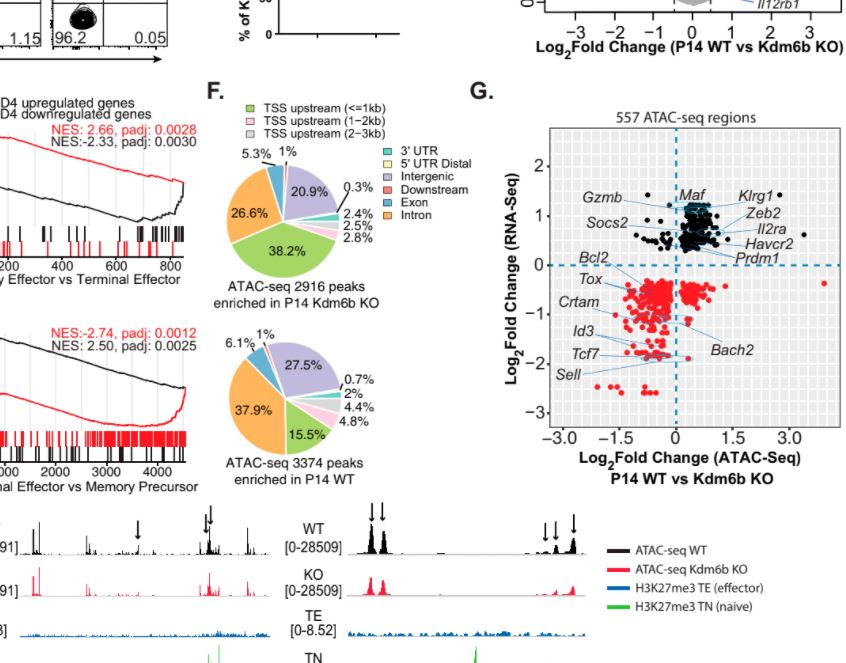Kdm6b Regulates the Generation of Effector CD8 + T Cells by Inducing Chromatin Accessibility in Effector-Associated Genes
The transcriptional and epigenetic regulation of CD8+ T cell differentiation is critical for balancing pathogen eradication and long-term immunity by effector and memory CTLs, respectively. In this study, we demonstrate that the lysine demethylase 6b (Kdm6b) is essential for the proper generation and function of effector CD8+ T cells during acute infection and tumor eradication. We found that cells lacking Kdm6b (by either T cell-specific knockout mice or knockdown using short hairpin RNA strategies) show an enhanced generation of memory precursor and early effector cells upon acute viral infection in a cell-intrinsic manner. We also demonstrate that Kdm6b is indispensable for proper effector functions and tumor protection, and that memory CD8+ T cells lacking Kdm6b displayed a defective recall response. Mechanistically, we identified that Kdm6b, through induction of chromatin accessibility in key effector-associated gene loci, allows for the proper generation of effector CTLs. Our results pinpoint the essential function of Kdm6b in allowing chromatin accessibility in effector-associated genes, and identify Kdm6b as a potential target for therapeutics in diseases with dysregulated effector responses.
Authors
Tianhao Xu; Alexander Schutte; Leandro Jimenez; Andre N A Gonçalves; Ashleigh Keller; Matthew E Pipkin; Helder I Nakaya; Renata M Pereira; Gustavo J Martinez
External link
Publication Year
Publication Journal
Associeted Project
Systems Immunology of Human Diseases
Lista de serviços
-
As antisense RNA gets intronic.As antisense RNA gets intronic.
-
Androgen responsive intronic non-coding RNAs.Androgen responsive intronic non-coding RNAs.
-
Conserved tissue expression signatures of intronic noncoding RNAs transcribed from human and mouse loci.Conserved tissue expression signatures of intronic noncoding RNAs transcribed from human and mouse loci.
-
The intronic long noncoding RNA ANRASSF1 recruits PRC2 to the RASSF1A promoter, reducing the expression of RASSF1A and increasing cell proliferation.The intronic long noncoding RNA ANRASSF1 recruits PRC2 to the RASSF1A promoter, reducing the expression of RASSF1A and increasing cell proliferation.
-
Antisense intronic non-coding RNA levels correlate to the degree of tumor differentiation in prostate cancer.Antisense intronic non-coding RNA levels correlate to the degree of tumor differentiation in prostate cancer.
-
Insight Into the Long Noncoding RNA and mRNA Coexpression Profile in the Human Blood Transcriptome Upon Leishmania infantum Infection.Insight Into the Long Noncoding RNA and mRNA Coexpression Profile in the Human Blood Transcriptome Upon Leishmania infantum Infection.
-
Long non-coding RNAs associated with infection and vaccine-induced immunityLong non-coding RNAs associated with infection and vaccine-induced immunity
-
Comparative transcriptomic analysis of long noncoding RNAs in Leishmania-infected human macrophagesComparative transcriptomic analysis of long noncoding RNAs in Leishmania-infected human macrophages
-
SARS-CoV-2 Selectively Induces the Expression of Unproductive Splicing Isoforms of Interferon, Class I MHC, and Splicing Machinery Genes.SARS-CoV-2 Selectively Induces the Expression of Unproductive Splicing Isoforms of Interferon, Class I MHC, and Splicing Machinery Genes.

